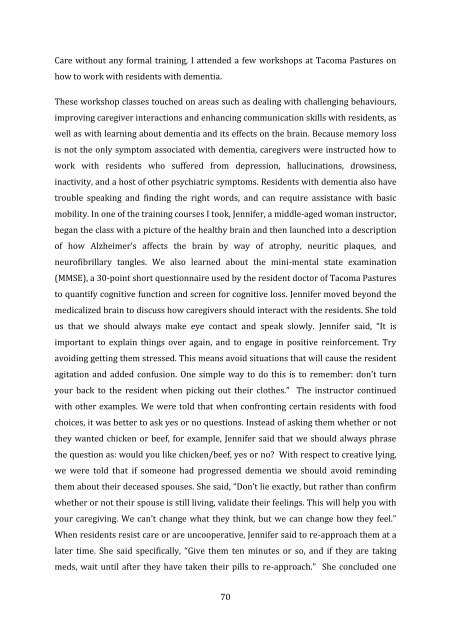Philip Y. Kao PhD thesis - Research@StAndrews:FullText
Philip Y. Kao PhD thesis - Research@StAndrews:FullText
Philip Y. Kao PhD thesis - Research@StAndrews:FullText
You also want an ePaper? Increase the reach of your titles
YUMPU automatically turns print PDFs into web optimized ePapers that Google loves.
Care without any formal training, I attended a few workshops at Tacoma Pastures on<br />
how to work with residents with dementia.<br />
These workshop classes touched on areas such as dealing with challenging behaviours,<br />
improving caregiver interactions and enhancing communication skills with residents, as<br />
well as with learning about dementia and its effects on the brain. Because memory loss<br />
is not the only symptom associated with dementia, caregivers were instructed how to<br />
work with residents who suffered from depression, hallucinations, drowsiness,<br />
inactivity, and a host of other psychiatric symptoms. Residents with dementia also have<br />
trouble speaking and finding the right words, and can require assistance with basic<br />
mobility. In one of the training courses I took, Jennifer, a middle-aged woman instructor,<br />
began the class with a picture of the healthy brain and then launched into a description<br />
of how Alzheimer’s affects the brain by way of atrophy, neuritic plaques, and<br />
neurofibrillary tangles. We also learned about the mini-mental state examination<br />
(MMSE), a 30-point short questionnaire used by the resident doctor of Tacoma Pastures<br />
to quantify cognitive function and screen for cognitive loss. Jennifer moved beyond the<br />
medicalized brain to discuss how caregivers should interact with the residents. She told<br />
us that we should always make eye contact and speak slowly. Jennifer said, “It is<br />
important to explain things over again, and to engage in positive reinforcement. Try<br />
avoiding getting them stressed. This means avoid situations that will cause the resident<br />
agitation and added confusion. One simple way to do this is to remember: don’t turn<br />
your back to the resident when picking out their clothes.” The instructor continued<br />
with other examples. We were told that when confronting certain residents with food<br />
choices, it was better to ask yes or no questions. Instead of asking them whether or not<br />
they wanted chicken or beef, for example, Jennifer said that we should always phrase<br />
the question as: would you like chicken/beef, yes or no? With respect to creative lying,<br />
we were told that if someone had progressed dementia we should avoid reminding<br />
them about their deceased spouses. She said, “Don’t lie exactly, but rather than confirm<br />
whether or not their spouse is still living, validate their feelings. This will help you with<br />
your caregiving. We can’t change what they think, but we can change how they feel.”<br />
When residents resist care or are uncooperative, Jennifer said to re-approach them at a<br />
later time. She said specifically, “Give them ten minutes or so, and if they are taking<br />
meds, wait until after they have taken their pills to re-approach.” She concluded one<br />
70
















